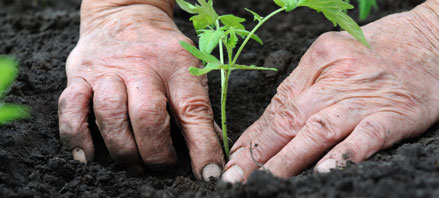Master Gardeners Offenders' Intervention
There is an ongoing tradition of using horticulture as a form of activity in secure settings, such as prisons but there is limited research evidence documenting its potential benefits and value. It is widely acknowledged that being out in the fresh air, nurturing and growing plants, can make a beneficial contribution to mental and physical health. Research carried out through Garden Organic’s Master Gardener’s programme has shown horticultural activities such as gardening and growing your own food, can lead to a range of positive behavioural changes including; supporting individuals’ to have a sense of community, learn new skills and improve wellbeing.
Researchers in our Faculty of Health and Life Sciences and the Centre for Agroecology, Water and Resilience worked in partnership with Garden Organic and HMP Rye Hill to understand and develop a gardening programme for substance misusing prisoners and promote new ways of supporting some of the most vulnerable individuals within the prison population.
The study was designed to evaluate the experiences of substance misusing prisoners on the programme to gain a better understanding of how the intervention could support rehabilitation both within the prison environment and on release into the wider community. Results showed that the programme has been successful in terms of helping to foster a sense of community between prisoners and staff, alongside offering a range of learning opportunities for participants. The study also points to the potential of prison based horticultural interventions to support individuals’ recovery through contributing to improvement in health and wellbeing.
As a result of the research, key evidence was found to support HMP Rye Hill’s plans to establish a recovery unit to help support the rehabilitation of substance misuse offenders during their time in prison and upon their release.
Further details and the full report on this research are available here.






